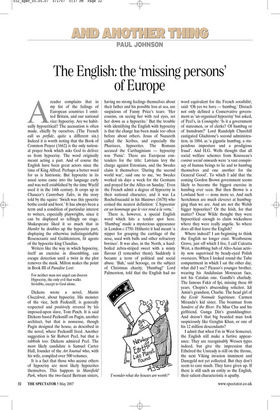The English: the ‘missing persons’ of Europe
Areader complains that in my list of the failings of European countries I omitted Britain, and our national vice: hypocrisy. Are we habitually hypocritical? The accusation is often made, chiefly by ourselves. (The French call us perfide, quite a different sin.) Indeed it is worth noting that the Book of Common Prayer (1662) is the only national prayer book which asks God to deliver us from hypocrisy. The word originally meant acting a part. And of course the English have been great actors since the time of King Alfred. Perhaps a better word for us is histrionic. But hypocrite in its usual sense came into the language early and was well established by the time Wyclif used it in the 14th century. It crops up in Chaucer’s Canterbury Tales, in the story told by the squire: ‘Swich was this ypocrite bothe coold and hoot.’ It has always been a term and a condition of particular interest to writers, especially playwrights, since it can be displayed so tellingly on stage. Shakespeare liked it so much that in Hamlet he doubles up the hypocrite part, displaying the otherwise indistinguishable Rosencrantz and Guildenstern, fit agents of the hypocrite king Claudius.
Writers like the way in which hypocrisy, itself an exercise in dissembling, can escape detection until a twist in the plot removes the mask. Milton makes the point in Book III of Paradise Lost:
For neither man nor angel can discern Hypocrisy, the only evil that walks Invisible, except to God alone.
Dickens wrote a novel, Martin Chuzzlewit, about hypocrisy. His monster of the vice, Seth Pecksniff, is generally respected and positively revered by his imposed-upon slave, Tom Pinch. It is said Dickens based Pecksniff on Pugin, another architect, but that is nonsense, though Pugin designed the house, as described in the novel, where Pecksniff lived. Another suggestion is Sir Robert Peel, but that is rubbish too: Dickens admired Peel. The most likely candidate is Samuel Carter Hall, founder of the Art Journal who, with his wife, compiled over 500 volumes.
It is a fact that those who accuse others of hypocrisy are most likely hypocrites themselves. This happens in Mansfield Park, where the two-faced Bertram sisters, having no strong feelings themselves about their father and his possible loss at sea, are suspicious of Fanny Price’s tears: ‘Her cousins, on seeing her with red eyes, set her down as a hypocrite.’ But the trouble with identifying the English with hypocrisy is that the charge has been made too often before about others. Jesus of Nazareth called the Scribes, and especially the Pharisees, hypocrites. The Romans accused the Carthaginians — hypocrisy was ‘Punic’. There are European contenders for the title: Latvians levy the charge against Estonians, and the Swedes claim it themselves: ‘During the second world war’, said one to me, ‘we Swedes worked six days a week for the Germans and prayed for the Allies on Sunday.’ Even the French admit a degree of hypocrisy in their national character, and it was La Rochefoucauld in his Maximes (1678) who coined the neatest definition: ‘L’hypocrisie est un hommage que le vice rend à la vertu.’ There is, however, a special English word which hits a tender spot here. ‘Humbug’ made a mysterious appearance in London c.1750. Hitherto it had meant ‘a nipper for grasping the cartilage of the nose, used with bulls and other refractory bovines’. It was also, in the North, a hardboiled zebra-striped sweet with a minty flavour (I remember them). Suddenly it became a term of political and social abuse. ‘Bah,’ said Scrooge, on the subject of Christmas charity, ‘Humbug!’ Lord Palmerston, told that the English had no word equivalent for the French sensibilité, said: ‘Oh yes we have — humbug.’ Disraeli not only defined a Conservative government as ‘an organised hypocrisy’ but asked, of Peel’s, in Coningsby: ‘Is it a government of statesmen, or of clerks? Of humbug or of humdrum?’ Lord Randolph Churchill castigated Gladstone’s second administration, in 1884, as ‘a gigantic humbug, a stupendous imposture and a prodigious fraud’. And H.G. Wells thought that all social welfare schemes from Rousseau’s contrat social onwards were ‘a vast conspiracy of human beings to lie and to humbug themselves and one another for the General Good’. To which I add that the coming Gordon Brown government seems likely to become the biggest exercise in humbug ever seen. But then Brown is a Lowland Scot — none more so. And such Scotchmen are much cleverer at humbugging than we are. And are not the Welsh bigger hypocrites? Or the Irish, for that matter? Oscar Wilde thought they were hypocritical enough to claim wickedness where they were really angelic. So where does all that leave the English?
Where indeed? I am beginning to think the English no longer exist. Westbourne Grove, just off which I live, I call Calcutta West, a throbbing hub of Afro-Asian activity now supervised by beady-eyed Polish overseers. When I looked round the Tube compartment in which I sat the other day, what did I see? Picasso’s younger brother, wearing his Andalusian Moroccan face, not his Catalan one. Gandhi’s charlady. The famous Fakir of Ipi, missing these 60 years. Chopin’s absconding solicitor. Idi Amin’s grandson, Charlie. The head girl of the Ecole Normale Supérieure. Carmen Miranda’s kid sister. The boatman from Sanders of the River. Fu Man Chu and his girlfriend, Gunga Din’s granddaughter. And doesn’t that big bearded man look suspiciously like Genghis Khan, or one of his 12 million descendants?
I admit that when I’m in West Somerset, the English still make a furtive appearance. They are recognisably Wessex types indeed, but give the impression that Ethelred the Unready is still on the throne, the next Viking invasion imminent and Danegeld not yet collected. But they don’t seem to care much. They have given up. If there is still such an entity as the English, their salient characteristic is apathy.


































































































 Previous page
Previous page